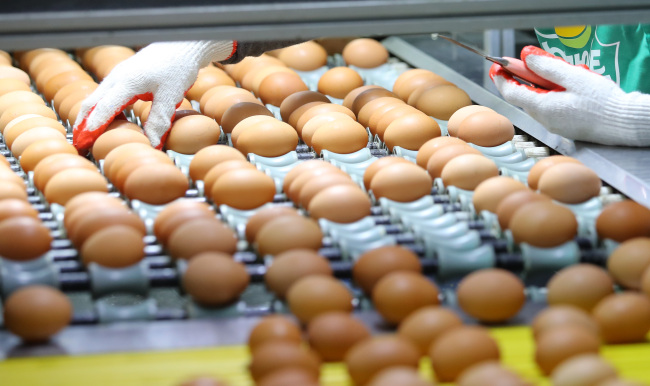Retail & Consumer
Eco-friendly farms found with excessive levels of insecticides
[THE INVESTOR] The contaminated egg crisis continued to spread in South Korea, with a total of 66 farms, mostly eco-friendly farms, found to have traces of banned or excessive levels of insecticides or pesticides as of Aug. 17.
As of Aug. 17, 66 farms were tested positive for restricted chemicals, according to the Ministry of Agriculture, Food and Rural Affairs.
 |
Since Aug. 15, the Agriculture Ministry and the Food Safety Ministry has set out to survey 1,239 of the total 1,456 laying chicken farms nationwide, excluding those that have suspended operations. As of 10 a.m. Thursday, they had completed the inspections for 876 of them.
The surveyed farms included 683 eco-friendly ones and 194 ordinary ones.
Of the 683 eco-friendly farms, 62 had eggs with traces of insecticides or pesticides. Eggs from eco-friendly farms are usually sold at double the prices of normal ones and should not contain any traces of insecticides.
Among them, 27 showed excessive levels of such substances, which means their eggs would not be qualified for commercial distribution even without the eco-friendly farm certification.
These farms were located nationwide, including 15 in Gyeonggi Province, five in South Chungcheong Province, three in South Gyeongsang Province, and one each in North Gyeongsang Province, South Jeolla Province, Gwangju and Gangwon Province. Among them, two were also detected to have used flufenoxuron, which is banned from use.
Of the 193 ordinary farms, four showed traces of insecticides at levels beyond the permitted amount.
The detected substances from the 66 farms include fipronil, which is banned from use, bifenthrin, flufenoxuron, and etoxazole.
The ministry said the eco-friendly farms that are found to have used any amount of pesticides would soon be deprived of their certificates.
Eggs from 31 farms will all be recalled and discarded, while eggs from the remaining 35 farms will be distributed in the market, but without the eco-friendly tag.
The nation has been gripped by an unprecedented egg scare since the revelation Tuesday that a farm in Namyangju was found with traces of fipronil, the same substance found in some eggs in Europe that has been stoking worldwide concern.
Fipronil is a broad-spectrum insecticide used to treat lice, fleas and ticks but it is not allowed to be used on chickens. Bifenthrin is often used on various agricultural crops to treat insects.
As the egg scare continued to spread, the government faced rising criticism for having relied on private businesses to review procedures for issuing the eco-friendly certificates, instead of handling them directly.
The ministry had commissioned 64 private businesses to handle certifying processes. The private businesses performed application reviews, as well as on site investigation on behalf of the government.
The eco-friendly certificate has been of great appeal to farmers as they can get financial support from the government and can sell their products at a price that is twice higher than usual if their eggs are designated as “eco-friendly”
Meanwhile, the nation’s egg consumption plunged amid growing concerns over tainted eggs.
Since 3 p.m. on Aug. 16, Korea’s leading market retailer E-mart has resumed selling eggs, but saw its egg sales drop by 40 percent, compared to the same day last week. Its egg supply also dropped by 44 percent, the company added.
By Shim Woo-hyun/The Korea Herlad (ws@heraldcorp.com)








